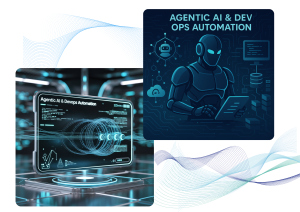Agentic AI & DevOps Automation
Agentic AI & DevOps Automation

DevOps has come a long way, from shell scripts and hand-rolled releases to CI/CD pipelines and container orchestration. But as environments get more distributed, data-intensive, and high-speed, old-school automation just isn’t going to hack it. That’s where Agentic AI steps in: clever, goal-driven AI agents that are reimagining how we automate DevOps.
Differing from standard bots or scripts employed for static automation, Agentic AI operates more like an active team member. They are agents that can sense their surroundings, reason upon the time of choice, learn from the results, and act without ongoing human oversight. Think of them as computer co-workers that don’t just take orders but know when to do something, react accordingly, and escalate when necessary, independently.
In DevOps, this is huge potential. Imagine a pipeline that breaks, and an AI agent identifies the issue, reverts the broken pipeline, notifies the right person, and even suggests a fix based on previous trends. That is the promise of Agentic AI.
Applications are growing exponentially. AI agents are now able to run intelligent test selection (run only the tests that are relevant according to code changes), auto-scale infrastructure according to traffic, triage problems in real time, and even detect security anomalies that human eyes can miss. This means tangible benefits: faster release cycles, less downtime, reduced cloud costs, and content creators who aren’t bogged down by manual firefighting.
Real-world tools are already adopting this paradigm. GitHub Copilot is transcending coding into CI/CD automation. Software like Dynatrace and ServiceNow is incorporating AI agents that detect, diagnose, and repair issues with minimal or no human intervention. Research tools utilizing AutoGPT and ReAct agent models are, in the meantime, under study for self-testing and code verification.
But such a change is not without pain. Over-dependence on independent AI might lead to accountability, debugging, and trust problems. How do we comprehend the reasoning of an AI agent when it gets something wrong? What if it arrives at that incorrect conclusion?
As long as these fears exist, rest assured on one thing: Agentic AI is not going to replace DevOps engineers; it’s going to augment them. The future will be one of collaboration, where repetitive, reactive tasks are taken care of by AI and humans focus on creativity, architecture, and high-impact decision-making.
In short, Agentic AI in DevOps is not a buzzword; it’s a paradigm shift. Companies that get on board with this early will gain a serious competitive edge when it comes to agility, resilience, and developer satisfaction. The AI-first generation of DevOps has begun, and the revolution has started.

